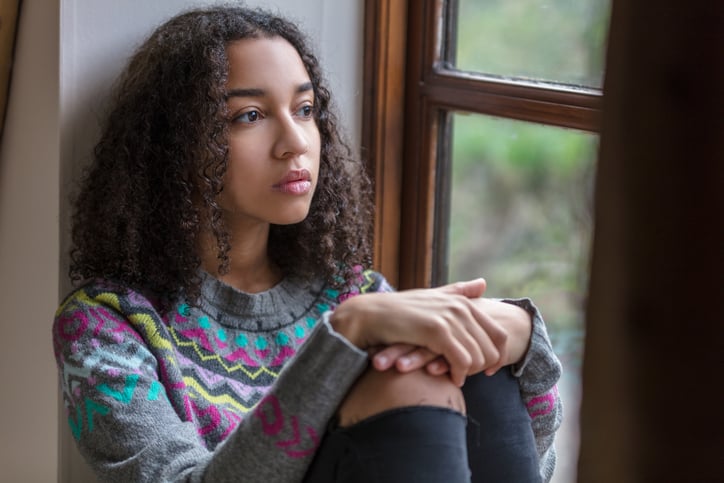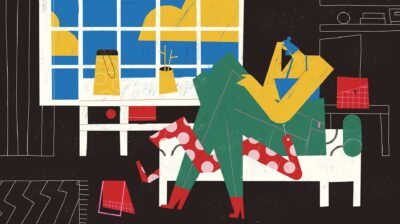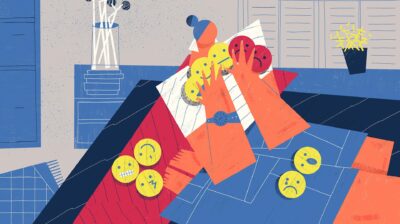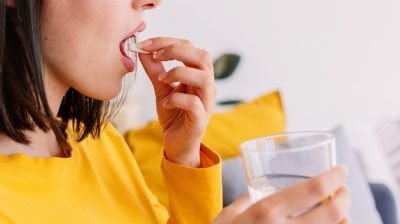Am I depressed?
Learn more about what depression is and the support options available.

Your mood can change on a daily basis. Many factors can impact your mood in positive or negative ways including your experiences, your environment, and your internal thoughts and feelings. Experiencing periods of low mood from time to time is normal. However, if low mood lasts for more than a couple of weeks and is negatively impacting your day-to-day functioning, you may be depressed. There are different levels of depression and different causes, but no matter what, there are effective treatments available and you deserve support. Full recovery from depression is possible with the right support.
What does it mean to be depressed?
People often use the word “depressed” to describe feeling low. However, when mental health professionals speak about depression, they are typically referring to clinical depression, which is a mental health condition.
Clinical depression is one of a spectrum of overlapping depressive conditions. Occasional low mood in response to stressful life events or even hormonal fluctuations is not the same as clinical depression. People who are depressed can experience a range of different symptoms, not all of which are shared. However, common symptoms of clinical depression include persistent low mood, feelings of hopelessness, and loss of interest in activities that you previously enjoyed. For people with clinical depression, these symptoms last longer than a couple of weeks and interfere with daily life, including work or education, social life, and close relationships.
Types of depression
No two people will experience depression in exactly the same way. The exact combination of factors and symptoms varies from person to person. Sometimes, people can experience depression alongside other physical, mental health, or neurodevelopmental conditions, like anxiety conditions, ADHD, and substance misuse. These co-occurring conditions may or may not contribute to the development or persistence of a person’s depression.
While each case of depression is unique, mental health professionals make distinctions between different types of depression. This helps them make decisions about what treatments might work best for you. Some types of depression, such as postpartum depression or seasonal affective disorder (SAD), are classified based on factors involved in the development of the depression.
Mental health professionals also sometimes categorise depression by how much it affects your daily life. You may hear these professionals talk about mild, moderate or severe depression. Using these categories helps ensure that people get appropriate mental health treatment that meets their needs.
However, even if your depression is categorised as ‘mild’, you and your experience still deserve to be taken seriously. Mental distress or suffering of any kind can have a significant impact on your daily life. Regardless of how this mental distress is categorised, you deserve compassionate care and support. It’s also important to note that, if your depression is characterised as ‘severe’, this does not mean you will not recover. With the right support or treatment, people with depression can achieve positive outcomes for their health and life.
What causes clinical depression?
Like all mental health conditions, depression doesn’t have a single cause. There are a lot of factors that can play a role in someone feeling depressed. When you are dealing with a number of things in your life that increase your risk of depression, they can interact, cause depression symptoms to emerge, and persist over time.
This process of multiple factors combining over time to cause depression is sometimes called a “downward spiral.” As depression symptoms emerge, they can also play a role in this spiral. For example, losing a job can lower your mood, which in turn can impact your motivation to do things you enjoy. This can cause you to spend less time with friends, which can lower your mood even more.
Who is at risk of depression?
Stressful, upsetting, or dangerous experiences can play a role in making a person feel depressed. Some factors which can increase a person’s risk of experiencing depression include:
- Having a difficult time at school
- Job loss
- Living with a long-term chronic illness or condition
- Losing someone close to you
- Financial troubles or facing difficult economic circumstances
- Periods of change and transition in your life
- Romantic breakup, separation or divorce
- Being bullied
- Experiencing emotional, physical, or sexual abuse, and/or neglect
- Experiencing trauma or having a history of trauma
- Social isolation and/or loneliness can also play a role in developing depression
- Experiencing discrimination
- Having a family member with depression
All of these factors can play a role in developing depression because of the impact they can have on your mood, your thinking, and your self-esteem. However, experiencing one or more of these risk factors doesn’t mean you’re definitely going to become depressed. Similarly, being without these risk factors does not necessarily mean a person won’t experience depression during their lifetime.
Although many factors can contribute to developing depression, sometimes people develop depression without any clear cause. This can make people feel guilty and ashamed, as they may feel that they have no “reason” to be depressed. It’s very important to be aware that you do not need a reason to be depressed. Sometimes, people can experience depression for no obvious reason.
Is grief the same as being depressed?
The death of a loved one can have a significant impact on your thoughts and emotions, making it more difficult to do everyday things. The low mood and difficult emotions that come with grief can make it look a lot like depression. Indeed, grief can sometimes play a role in someone developing depression, but grief and depression are different. Grief is a response to loss and while loss can always be painful, the intensity of grief typically eases over time. On the other hand, depression is a complex and ongoing mental health condition that is caused by a range of interacting factors.
Signs and symptoms of depression
When people hear depression, they often think about low mood, but there are many signs and symptoms of depression. It can create changes in your emotional, physical, and social functioning. Not everyone who is depressed will have the same collection of symptoms because depression affects people in different ways. Not all symptoms of depression will emerge at the same time either. Some will develop earlier, while others develop later when the condition becomes more severe. Depression can develop gradually, so it can sometimes be difficult to see what’s actually wrong at first. You may attempt to deal with the symptoms in your own ways without realising what you’re experiencing is depression.
Below is a list of symptoms associated with depression. It’s important to remember that not everyone with clinical depression will experience all of these symptoms and this list does not cover every symptom someone with depression may have. Additionally, since everyone has periods of low mood and poor mental health from time to time, you can also experience some of these symptoms and it does not necessarily mean you have clinical depression.
Emotional symptoms of depression
- Feelings of overwhelming sadness and hopelessness
- Feeling intense guilt
- Feeling irritable
- A loss of interest or pleasure in everyday activities or hobbies
- Having no motivation
- Finding it difficult to make decisions
- Feeling anxious
Physical symptoms of depression
- Changes in sleep patterns like finding it difficult to fall asleep or waking up very early in the morning
- Changes in appetite
- Lack of energy
- Moving or speaking more slowly than usual
- Unexplained aches or pains
- Headaches
- Trouble concentrating
- Difficulty caring for yourself
Social symptoms of depression
- Not doing well at work or school
- Not being able to complete tasks or activities
- Avoiding contact with your friends and taking part in fewer social activities
- Ignoring your hobbies and interests
Treatments that can help if you are depressed
If you think you might have depression, reaching out for support can help you get back to feeling yourself. When you’re looking for professional mental health support, visiting your GP is a good way to start finding treatment options. There are a variety of evidence-based treatments for clinical depression, including talk therapies and medications. Treatment combinations vary based on the severity and nature of your depression.
Lifestyle changes
Along with professional treatments, there are several lifestyle changes your GP might recommend to help ease the symptoms of your depression and support your overall wellbeing and recovery. One common change is introducing physical movement like exercise, which research shows can have a positive impact on your mood. Another lifestyle change is meditation or mindfulness exercises, which help you become more aware of your thoughts and feelings. Meditation can be particularly useful in helping people maintain positive mental health following a period of depression. Some people also find self-help groups or books useful in changing thought patterns or helping them to express their feelings.
While all of these things can be helpful, it’s also important to keep in mind that experiencing depression can make it really difficult to complete tasks, even simple ones. For that reason, making a lot of lifestyle changes on your own may not be achievable when you’re dealing with depression. It’s important to be patient and kind to yourself if this is the case. You don’t have to feel guilty for not having the capacity to make these changes right now.
Therapy options
Talking therapy is usually a common form of treatment for clinical depression. There are many different types of talk therapy. The aim of talking therapy is to help you understand the root causes of your depression and to change the thoughts, feelings and behaviours that may be playing a role in maintaining your depression. Working with a therapist can help you develop new tools and strategies for managing your symptoms.
The most common type of psychotherapy for people with depression is Cognitive Behavioural Therapy (CBT). This type of therapy involves identifying thoughts that are causing issues for you and replacing them with more balanced ones to improve your behaviours and reactions in different situations.
Medication options
There are many medications available to help people manage the symptoms of depression or prevent them from reoccurring. The two main kinds are selective serotonin reuptake inhibitors (SSRIs) and serotonin and norepinephrine reuptake inhibitors (SNRIs). Antidepressants can take a few weeks or months to become fully effective and your doctor may work up to your full dose gradually to avoid the risk of side effects. Additionally, it’s important to take your antidepressants as prescribed and not stop taking them without consulting your GP, because sudden withdrawal can have side effects too.
Don’t be discouraged if the first medication you try isn’t a perfect solution. These medications are prescribed for a variety of conditions and will have different side effects for different people. Work with a GP or psychiatrist to find the one that works for you.
How friends and family can help
Living with and recovering from depression can be daunting, but you don’t have to do it alone. Dealing with depression can be made easier if the people around you take the time to learn about the condition, how it impacts you, and how they can show understanding and support you. If you found the information in this article helpful, it could be a good idea to share it with some of the people in your life.
Feeling overwhelmed and want to talk to someone?
- Get anonymous support 24/7 with our text message support service
- Connect with a trained volunteer who will listen to you, and help you to move forward feeling better
- Whatsapp us now or free-text SPUNOUT to 50808 to begin.
- Find out more about our text message support service
If you are a customer of the 48 or An Post network or cannot get through using the ‘50808’ short code please text HELLO to 086 1800 280 (standard message rates may apply). Some smaller networks do not support short codes like ‘50808’.






